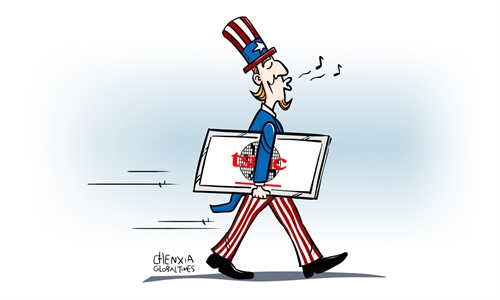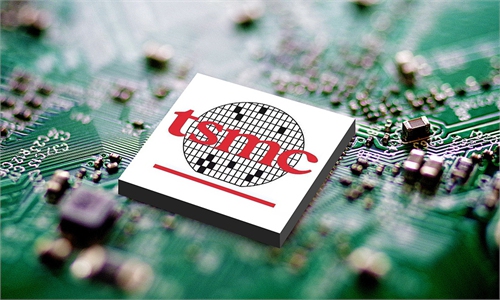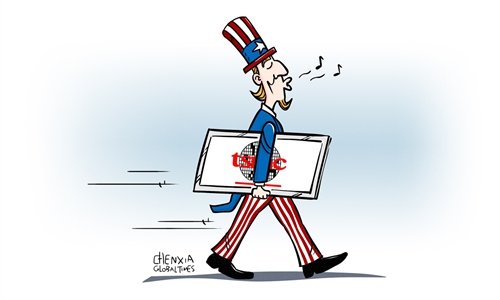GT Voice:DPP’s collusion with US puts Taiwan’s chip sector in life-or-death situation

chip Photo:VCG
There have been growing signs that the Taiwan island's Democratic Progressive Party (DPP) authorities' attempt to use its semiconductor manufacturing sector as proof of allegiance to win Washington's support is gradually pushing the region's industrial chain to the brink.
US Commerce Secretary Gina Raimondo said in an interview on Friday that the US has relied too much on the Taiwan island for chips, which is "unsustainable" and "dangerous," according to Bloomberg. The US isn't looking to make all semiconductor chips on its own soil but must rely less on Asia, she noted.
Her comments once again sounded the alarm for Taiwan's chip manufacturing industry. At a time when the US is trying to regain control of the global chip industry and closer cooperation with Taiwan doesn't seem to be an option for the US, what's waiting for the region's chip manufacturing industry in the future seems very dire.
Indeed, Washington's plot for Taiwan's chip manufacturing capability has been playing out for some time. The US' 100-Day Supply Chain Review Report said: "The United States is heavily dependent on a single company - TSMC - for producing its leading-edge chips." The fact that only TSMC and Samsung can make the most advanced semiconductor microchips "puts at risk the ability to supply current and future [US] national security and critical infrastructure needs."
As TSMC is being turned into "USSMC," the US' attempt to hollow out Taiwan's chip industry to develop its own is no secrete at this point.
Another sobering fact is that the US is apparently not content with its control over the existing global semiconductor industrial chain. Under the banner of bolstering semiconductor supply chain security, the US has been promoting the so-called 'Chip 4 Alliance' in Asia in an attempt to crack down on the Chinese mainland industries. It has also been seeking to boost chip collaboration with countries like Canada and India that don't have an impressive presence in the global chip sector. In late March, the US and Canada said they would work together to create a bilateral semiconductor manufacturing corridor, Reuters reported. Also, during a visit to India in March, Raimondo discussed collaborating on making semiconductor chips with New Delhi, according to CNBC.
What is now becoming increasingly clear is that all of these moves will point to the same direction that the US will benefit the most by developing a global semiconductor industrial chain completely dependent on the US at the expense of weakening the Asian chip manufacturing industry, particularly that of the Taiwan island.
These developments should serve as a wake-up call for the DPP authorities, but sadly, they only see the chip industry as a leverage that can be used to increase the island's exposure and win support from the US. What's worse, the DPP authorities have not only shown no resistance to the US' ulterior motives, but have also colluded with external forces to stir up tensions in the Taiwan Straits, offering US politicians more ammunition to play up the geopolitical uncertainty in the region's chip manufacturing sector and urgency to reduce reliance on the region. If the secessionist DPP authorities continue to play with fire, then the accelerated decline of Taiwan's chip manufacturing sector seems inevitable. If Taiwan's chip industry is really hollowed out, the DPP will be the biggest culprit.
To meet the challenges of industrial hollowing out, Taiwan has no choice but to integrate with the Chinese mainland. As the largest market for the global semiconductor industry, the mainland represents more application scenarios and complete supporting industries. In fact, for decades, the cross-Straits trade connectivity has played an important role in facilitating the rise of Taiwan's semiconductor sector.
The DPP's attempt to collude with Washington is a dead end. This is because too many geopolitical and economic considerations determine that the US will not allow Taiwan's chip industry to develop further. If Taiwan's role in the global semiconductor industrial chain is supplanted by others, the region's economy will be seriously damaged. Therefore, for the sake of the regional economy and livelihood, Taiwan's only choice is to strengthen cooperation with the mainland to protect its prized industry, rather than falling into the US' trap of "economic decoupling."



